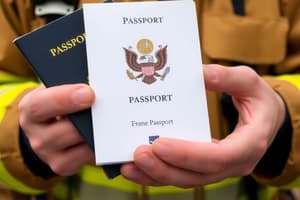Podcast
Questions and Answers
What should the first arriving unit do if fire or smoke is visible at the scene?
What should the first arriving unit do if fire or smoke is visible at the scene?
- Perform a 360 assessment of the incident
- Locate a Primary (Level 1) staging area
- Establish the department personnel accountability system
- Declare fast attack mode and request a tactical channel (correct)
Where should the accountability location be established during the initial arrival and on-scene procedures?
Where should the accountability location be established during the initial arrival and on-scene procedures?
- At the scene of the fire or smoke
- At the incident command post (correct)
- At the location of the primary staging area
- Next to the utilities to be secured
Which mode should be declared based on extent of fire, life hazards, building construction, and occupancy premises?
Which mode should be declared based on extent of fire, life hazards, building construction, and occupancy premises?
- Offensive (correct)
- Defensive
- Investigative
- Fast Attack
What should be developed based on available and arriving personnel during the initial arrival and on-scene procedures?
What should be developed based on available and arriving personnel during the initial arrival and on-scene procedures?
What should the IC incorporate into all levels of the incident management system?
What should the IC incorporate into all levels of the incident management system?
Which practice should Division/Group supervisors implement during all emergency incidents?
Which practice should Division/Group supervisors implement during all emergency incidents?
What must the ventilation crew coordinate with to avoid changing the fire flow path?
What must the ventilation crew coordinate with to avoid changing the fire flow path?
What factor should be considered when requesting additional resources?
What factor should be considered when requesting additional resources?
Flashcards are hidden until you start studying
Study Notes
Fire Scene Initial Actions
- The first arriving unit must assess the situation for fire or smoke, prioritizing life safety and establishing a quick operational plan.
- Immediate action may involve initiating command, providing a scene size-up report, and implementing necessary emergency actions.
Accountability Location
- Establish an accountability location in proximity to the scene, ideally at the command post, to ensure all personnel are tracked and managed effectively throughout the incident.
Incident Command Mode
- Declare the appropriate mode of operation based on fire extent, life hazards present, building construction features, and occupancy characteristics.
- Modes include Investigative, Offensive, or Defensive, tailored to the situation.
Personnel Management
- Develop resource allocation and tactical strategies based on personnel available and those arriving on-scene, ensuring maximum efficiency and safety.
Incident Management System
- The Incident Commander (IC) must integrate a clear communication strategy, standard operating procedures, and resource management throughout all levels of the incident management system.
Division/Group Supervisor Practices
- Division/Group supervisors should implement consistent operational practices, such as ensuring clear assignment of tasks and maintaining situational awareness during all emergency incidents.
Ventilation Coordination
- The ventilation crew must coordinate closely with the incident command and crews operating at the scene to prevent unintended changes in fire flow path, which can exacerbate the situation.
Resource Request Considerations
- When requesting additional resources, consider factors such as the complexity of the fire, potential for escalation, and current resource effectiveness to ensure optimal support.
Studying That Suits You
Use AI to generate personalized quizzes and flashcards to suit your learning preferences.



